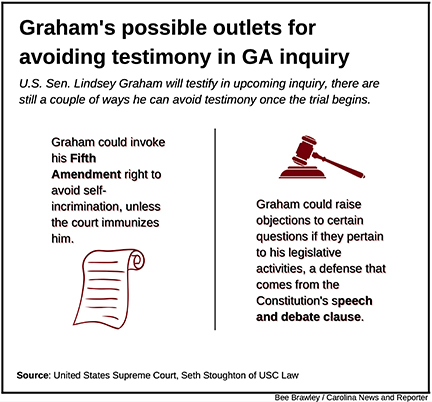Sen. Lindsey Graham will testify in a Georgia inquiry. Photo by Al Teich/Shutterstock
Republican Sen. Lindsey Graham will have to testify in court a 2020 election inquiry in Georgia, but that doesn’t necessarily mean he will say anything on the stand.
Despite being subpoenaed, Graham could plead the Fifth Amendment, which allows a defendant to avoid answering questions under oath.
Anyone — including lawmakers — can “plead the Fifth.”
But the right to remain silent can’t be used just to avoid answering a question, said Joe McCulloch, a Columbia attorney who’s not affiliated with the case. The amendment requires that “information you are being asked to provide would actually incriminate you and give material evidence against yourself of commission of a crime, or involvement in a crime,” McCulloch said.
Still, Graham could see a few surprises, said Seth Stoughton, a University of South Carolina Law professor.
The government can choose to immunize someone in order to force them to testify, eliminating the need for a Fifth Amendment plea, Stoughton said.
“They can essentially take criminalization or incrimination off the table,” Stoughton said. “There’s no privilege against self-incrimination when there’s no incrimination.”
There is currently no talk of Graham receiving any kind of immunity. If he did, it would have to be from both state and federal governments in order for it to be effective, McCulloch said.
A special Georgia grand jury on Nov. 17 will begin examining efforts made by former President Donald Trump and some of his associates to overturn the 2020 presidential election. The inquiry will be held in downtown Atlanta. No one, including Graham, has been charged.
Graham’s involvement concerns phone calls he made to the Georgia secretary of state following the 2020 election, as noted by Fulton County Superior Court Judge Robert C.I. McBurney. In those phone calls, Graham asked about the possibility that already-counted absentee ballots “be re-examined” to see if they might produce a more favorable outcome for Trump, according to McBurney, The New York Times reported.
“The conversation that Senator Graham had with this elected official in Georgia — at least one side of that conversation — has been the subject of a good deal of publicity and public comment, and Senator Graham has said that he was entirely innocent,” McCulloch said. “So we’ll see if he is willing to answer questions about what he has labeled and characterized as an innocent conversation.”
Graham was subpoenaed in July. Since then, he has been engaged in legal battles to avoid testimony.
His shield from testimony, according to Graham, is the Constitution’s speech and debate clause. This clause is generally used to protect members of Congress from the speech they use in legislative contexts from being used against them in lawsuits.
While the Supreme Court’s ruling will have Graham testifying, it ordered that Graham can raise objections to any questions that might involve his legislative activities.



